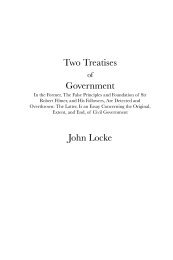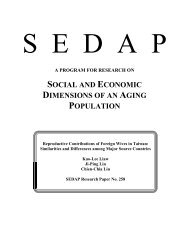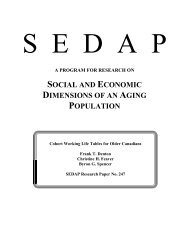Das Geheimnis des Opfers oder Der Mensch ist, was er iÃt The ...
Das Geheimnis des Opfers oder Der Mensch ist, was er iÃt The ...
Das Geheimnis des Opfers oder Der Mensch ist, was er iÃt The ...
Create successful ePaper yourself
Turn your PDF publications into a flip-book with our unique Google optimized e-Paper software.
eat<strong>er</strong>s, [<strong>The</strong> text of Hom<strong>er</strong> actually has hippemolgoi. Iliad 13.5. My thanks to William<br />
Slat<strong>er</strong> for pointing this out — C.L.], although the name hippomolgos itself already means<br />
a milk<strong>er</strong> of horses, a drink<strong>er</strong> of horse milk. Thus, in the Odyssey, he calls a people to<br />
whom Odysseus comes in his wand<strong>er</strong>ings, lotus-eat<strong>er</strong>s. In the same way he speaks of<br />
people who “know nothing of the sea and who do not enjoy any food mixed with salt,”<br />
and charact<strong>er</strong>izes the inhuman or sup<strong>er</strong>-human rawness of the cyclops, Polyphemos, by<br />
portraying him, too, as a cannibal and explicitly calling him a cannibal, androphagos.<br />
As with Hom<strong>er</strong>, the Greek geograph<strong>er</strong>s and h<strong>ist</strong>orians too <strong>des</strong>ignated peoples only<br />
according to their favourite or conspicuous foods and speak accordingly of<br />
ichthyophagoi, eat<strong>er</strong>s of fish, chelonophagoi, eat<strong>er</strong>s of turtles, akridophagoi, eat<strong>er</strong>s of<br />
grasshopp<strong>er</strong>s, struthophagoi, eat<strong>er</strong>s of ostriches, rhizophagoi, eat<strong>er</strong>s of roots, hylo- and<br />
sp<strong>er</strong>matophagoi, eat<strong>er</strong>s of wood and seeds, i.e., people who live from the fruit of tend<strong>er</strong><br />
branches of wild trees; agriophagoi, eat<strong>er</strong>s of game, i.e., those (according to Pliny) who<br />
nourish themselves from the meat of panth<strong>er</strong>s and lions; pamphagoi, omnivores;<br />
ophiophagoi, eat<strong>er</strong>s of snakes, such as the Panchaeans according to Pomponius Mela;<br />
artophagoi, eat<strong>er</strong>s of bread, such as the Egyptians, according to Athenaeus on account of<br />
their m<strong>od<strong>er</strong></strong>ation; anthropophagoi, cannibals.<br />
Hom<strong>er</strong>, howev<strong>er</strong>, names not only people according to their foods: he makes<br />
nourishment itself into a charact<strong>er</strong><strong>ist</strong>ic adjective and signifi<strong>er</strong> of humans in gen<strong>er</strong>al. He<br />
ref<strong>er</strong>s to people as grain or bread eat<strong>er</strong>s, eith<strong>er</strong> in a composite word, sitophagoi, or<br />
separately: “the people of the earth who eat bread”, “the fruit of the earth” or “ mortals<br />
eating the grain of Demet<strong>er</strong>.” Indeed, Hom<strong>er</strong> sets the diff<strong>er</strong>ence between the gods and<br />
men in the v<strong>er</strong>y diff<strong>er</strong>ence among their foods. <strong>The</strong> god<strong>des</strong>s Calypso placed before<br />
Odysseus: “all sorts of nourishment, of which he would eat and drink, which mortal men<br />
enjoy”: but for h<strong>er</strong>, “h<strong>er</strong> maids<strong>er</strong>vants provided ambrosia and nectar”. <strong>The</strong> Iliad<br />
expressly states: “the gods do not eat bread, nor do they drink sparkling wine, and for that<br />
reason they have no blood and are called immortal.” <strong>The</strong>y eat ambrosia; but ambrosia,<br />
according to the ancients, means immortal food. According to the m<strong>od<strong>er</strong></strong>ns it is a<br />
substantive and means simply immortality. God is what he eats. He eats ambrosia; i.e.,<br />
immortality or immortal food; thus is he immortal, a god; man, on the oth<strong>er</strong> hand, eats








